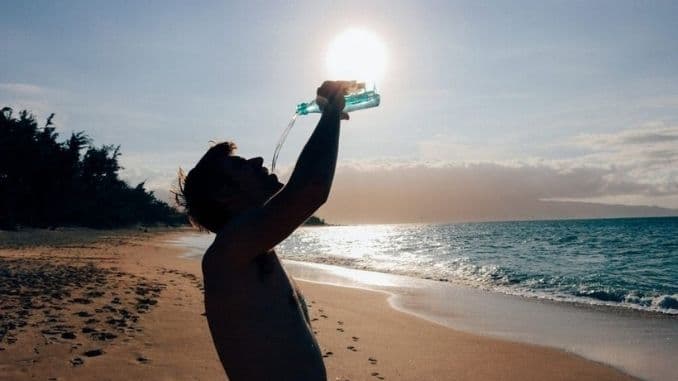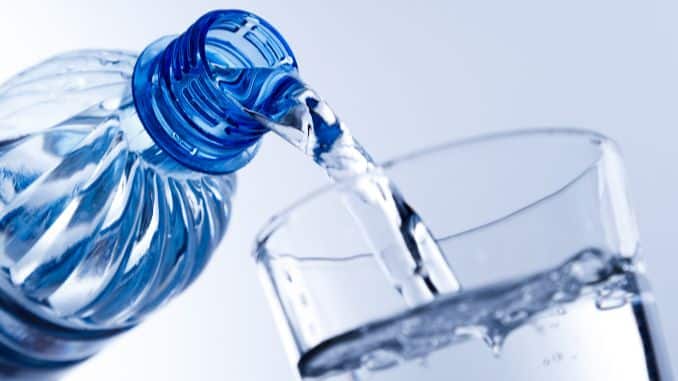
Gina blinked her eyes and tried to focus on her screen. She had a big project due in 2 hours, but her brain wasn’t cooperating with her. She plugged in her earphones and tried to wake up to the music, but 30 minutes later, she was still dragging.
Peter listened to his assistant run down his list of tasks to do and, before she was done, he snapped at her. He immediately regretted it. He rarely raised his voice, especially not to staff members. Also, he rubbed his head, took a sip of his coffee and told himself he needed to calm down.
Both of these people are suffering from a common ailment: mild dehydration. It’s probably the last thing they’ll imagine could be causing their symptoms, but it should be the first because being even slightly short on tips for staying hydrated can cause brain fog, loss of focus, irritability and mood swings, among other problems.
According to a report by CBS News, up to 75 percent of Americans may be functioning in a chronic state of dehydration, not only because they’re not drinking enough water but also because they’re drinking other beverages that can be mildly dehydrating.
Tips for Staying Hydrated: How Much Water Do We Need?
Tips for Staying Hydrated: Water makes up about 75 percent body weight in infants and 55 percent body weight in elderly people and is essential to life. Water performs a number of functions in the body, including the following:
- Lubricates the joints
- Helps deliver oxygen throughout the body — blood is mostly water
- Cushions the brain, spinal cord, and other tissues
- Regulates body temperature
- Helps maintain blood pressure
- Necessary for regular digestion
- Prevents kidney damage
- Makes minerals and nutrients available to the body
- Removes waste and toxins
These are just a few of water’s functions in the body — there are many more. The question then becomes: How much water do we need every day? The Centers for Disease Control and Prevention (CDC) notes that daily fluid intake “is defined as the amount of water consumed from foods, plain drinking water, and other beverages.” We can get fluid from things other than water, although plain drinking water is recommended as one of the best ways to hydrate because it has zero calories and provides only benefits to the body with no drawbacks.
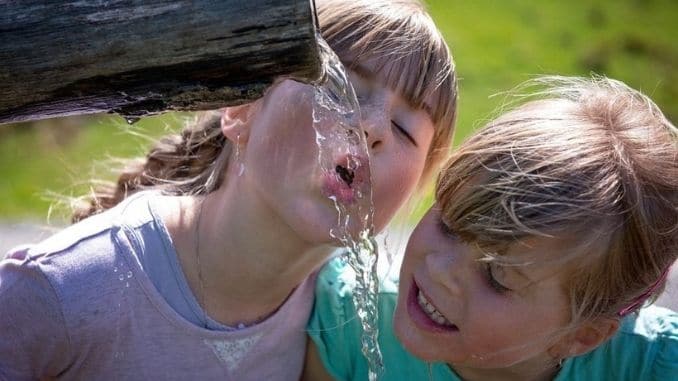
The Institute of Medicine states the adequate intake for total water from a combination of drinking water, beverages and food is:
- For young men ages 19 to 30 years: about 15.5 cups, of which about 13 cups is water and other beverages
- For young women ages 19 to 30 years: 11.5 cups, of which about 9 cups is water and other beverages
The standard advice is to drink eight 8-ounce glasses of water per day, but it’s difficult to determine a set amount as so many things can affect your daily hydration, including:
- The foods you’re eating
- How active you are
- The air temperature
- The altitude
- Your size and weight
- Your overall health — fever, vomiting, and diarrhea deplete body fluids
- Whether you’re pregnant or breastfeeding
You may have heard that your urine color can tell you if you’re getting enough water. Although a number of things can affect the color of your urine, including vitamins you may be taking or the types of foods you’re eating, in general, the lighter your urine color, the more hydrated you are. A dark, deep yellow color may suggest dehydration. Urine should be a very pale yellow if you’re properly hydrated.
Most health experts also suggest that you listen to your thirst as you’re body will naturally tell you when you need water. Our busy lifestyles, however, can cause us to miss these signals. Older adults, too, are less likely to notice that they’re thirsty.
What Does Dehydration Do to You?
Dehydration occurs when the body loses more fluid than it takes in, and it no longer has what it needs to carry out its normal, daily functions. Without replacement water, symptoms develop. How severe those symptoms depend on how low you are on your fluids but, in general, symptoms of dehydration include:
- Dry mouth
- Muscle weakness
- Headaches
- Dizziness
- Fatigue or lethargy
- Dry eyes or blurred vision, particularly when exercising
- Muscle cramps
- Nausea
Severe dehydration, which is defined as a loss of 10 to 15 percent of the body’s water, may include more serious symptoms like:
- Sunken eyes
- Low blood pressure
- Fever
- Increased heart rate
- Shriveled, dry skin
- Delirium
- Inability to sweat
- Unconsciousness
Most people will never experience this dangerous form of dehydration because it’s most likely when individuals are suffering from other major illnesses, from long-term diarrhea or vomiting or from exercising vigorously in the hot weather. Mild dehydration, however, is a much more common condition.
What Happens When You’re Slightly Dehydrated
Studies have found that even mild dehydration can cause emotional and physical problems in people but, unfortunately, we’re often unaware of it. In two studies out of the University of Connecticut, for example, researchers found that mild dehydration could alter a person’s mood, energy level and ability to think clearly.
Tips for Staying Hydrated: Researchers also discovered that thirst isn’t always a reliable indicator of when we need water. “Our thirst sensation doesn’t really appear until we are one or two percent dehydrated,” said study author Lawrence E. Armstrong. “By then, dehydration is already setting in and starting to impact how our mind and body perform.”
In a test involving young women, scientists found that mild dehydration caused headaches, fatigue, mood changes and difficulty concentrating and also made tasks feel more difficult. In a test involving young men, it caused some difficulty with mental tasks, especially those requiring lots of focus and working memory. Men also experienced fatigue, tension, and anxiety.
If you’re trying to concentrate on a project, you have to be sure you’re staying hydrated. In a 2014 study, researchers found that a water loss of only 1 to 2 percent could impair cognitive performance, resulting in poor concentration, increased reaction time, short-term memory problems, moodiness, and anxiety.
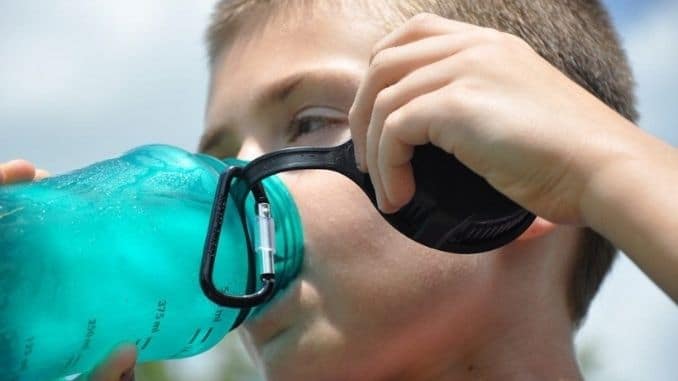
In a large 2018 review, researchers evaluated data from 33 studies and found that mild dehydration significantly affected attention, motor coordination, and executive function. Also, in another small study on women, mild dehydration caused the participants to commit 12 percent more errors in a card game than they did when fully hydrated.
How might a person become slightly dehydrated? It can happen in all sorts of situations, whether you’re exercising hard or working at the computer. If you’re hiking at only a moderate intensity, you could become mildly dehydrated in just an hour. If you’re running in the hot weather, it could happen in only a half hour.
Tips for Staying Hydrated: The important thing is to realize that if you’re feeling a little “off,” it could be that you need to rehydrate. Pay attention to your thirst, to any symptoms that you may be feeling and to your urine color to keep yourself properly hydrated.
10 Tips for Staying Hydrated
Whether you’re a busy mom, business executive or serious athlete, there are times when you may find staying hydrated challenging. Here are 10 tips for staying hydrated to help:
- Drink water instead of soda: According to a 2016 study, drinking sugar-laden drinks worsens dehydration. Always turn to water when you’re thirsty.
- Always keep a water bottle with you: Carry a stainless-steel or other type of reusable bottle with you and keep refilling it throughout the day.
- If you’re hungry, drink: Sometimes, when you feel hungry, you’re actually thirsty. The body knows it can get fluids from food too, so your signals can get crossed. Try drinking first to see if the urge goes away.
- Keep a water chart: If you have a hard time remembering to drink throughout the day, keep a chart nearby and make a mark each time you finish a glass of water, shooting for at least eight glasses a day.
- Drink before each meal: Studies show that when you drink a full glass of water before a meal, you’ll likely consume fewer calories.
- Always drink after exercise: If you’re a serious athlete, make sure you always have water nearby or with you so you can stay hydrated.
- Eat more water-filled foods: Certain foods can help keep you hydrated and help you lose weight since they make you feel full with minimal calories. Eat more melons, soups, salads, berries, peaches, citrus fruits, cucumbers, celery, zucchini, tomatoes, peppers, grapefruit, cabbage, cottage cheese, radishes, spinach, broccoli, carrots, apples, pears, pineapple, yogurt, grapes, and kiwi.
- Drink before going outside: The American College of Sports Medicine suggests that you drink at least 16 to 20 ounces of fluid 1 to 2 hours before engaging in an outdoor activity. Then you should continue to drink 6- to 2 ounces every 10 to 15 minutes that you’re busy outside.
- Create fruit water: Add fruit slices to a pitcher of water and allow to chill to create a super hydrating drink. Good options include citrus fruits, berries, and apples.
- Set a timer: Use your smartphone to set a timer to go off every hour. When it does, drink an 8-ounce glass of water.
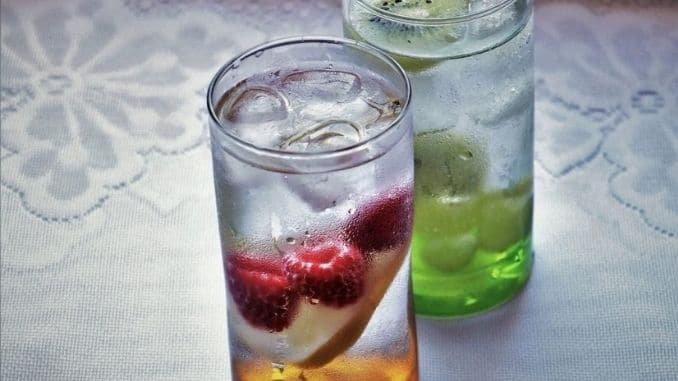
Is it possible to drink too much? It’s rare, but it can happen. If you experience nausea, confusion, or seizures, and you’ve been drinking a lot, you may have overdone it.
For your guide to the best foods to heal your body, check out The Best Foods that Rapidly Slim & Heal in 7 Days, here!

